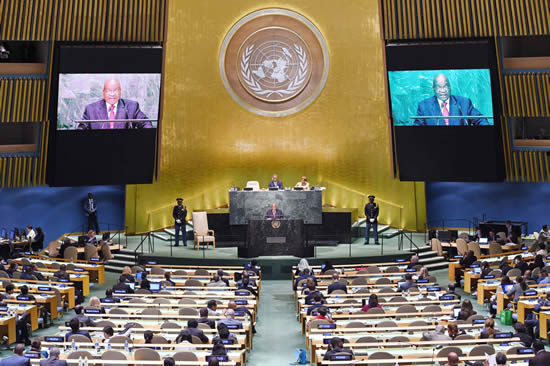
Participating recently in the yearly United Nations General Assembly (UNGA) in New York I was struck once again by the range of issues confronting humanity across the globe, from armed conflict and the challenges of climate change, to radicalisation and extremism.
From South Sudan, Yemen and Libya on our own continent, to Syria, Iraq, Afghanistan, the Middle East, North Korea and the Ukraine, the world faces instability, conflict and insecurity that threatens and should concern all of humanity.
The 2016 UNGA brings to mind the prominence with which our own country featured on the global agenda during the years of apartheid.
Forty years ago, in 1976, the United Nations General Assembly responded strongly to the plight of black South Africans following the Soweto Youth Uprising and similar explosions of resistance and anger elsewhere in our country.
One of the 1976 UNGA resolutions called on UN member states and the global organisation’s specialised agencies to help Lesotho and other countries bordering South Africa provide educational facilities to the rapidly growing number of refuge students from South Africa.
The resolution expressed the UN’s concern about the large number of South African students fleeing to Botswana, Lesotho and Swaziland, “imposing a heavy burden on the limited resources and employment opportunities of these countries”.
Looking back over this history reminds us how deep the legacy of apartheid runs in our country. The South Africa of 1976 is not the South Africa of 2016 where international companies freely invest and subscribe to the values of our democratic system. 
In 2016, as we undo the apartheid legacy, we find ourselves in a South Africa where organisations such as the Black Business Council, the Black Management Forum and others continue to wage a struggle to make our economy fully inclusive.
For any economy to succeed, the majority of the citizens must play a meaningful role, beyond being workers. They must participate also as owners, executives and senior managers and also as policy makers in the economy.
This is the motivation behind government’s policies on broad-based black economic empowerment which must be embraced by the public and private sectors.
Government knows that for broad-based black economic empowerment to succeed in the public sector, we must use our procurement muscle to sustain and grow black businesses.
Annually, through the public sector procurement system, government spends around R500 billion on goods and services and construction work alone.
The buying power of the state is therefore a powerful tool that must be used to advance black economic empowerment.
To take this further, government is working to repeal a law and regulations that uses a system of BEE preference points on which firms doing business with government are rated.
We have found this not to work, as it has done little to change the skewed ownership and control of the South African economy.
One of the main changes contained in the proposed new Preferential Procurement Regulations is the introduction of a compulsory sub-contracting clause.
It will be compulsory to sub-contract a minimum of 30 percent of the value of the contract for all contracts above R30 million, to small and emerging enterprises owned by women, youth, black people or persons with disability.
One of the biggest challenges facing black businesses and the implementation of our empowerment policies is access to finance.
To address this, we created the National Empowerment Fund (NEF) to financially support empowerment initiatives. Since its inception, approvals by the NEF have totaled R7.6 billion, supporting 770 black businesses.
For the 2015/16 financial year, the NEF has approved 120 worth R1.3 billion.
The Industrial Development Corporation (IDC) has provided R31 billion over the past five years to companies that are black-empowered. The IDC has also allocated R23 billion to the relatively new black industrialist programme.
In its first year of roll-out, the Department of Trade and Industry has approved 22 Black Industrialist projects with a total value of R1.2 billion. Over 1 000 direct jobs have been supported.
This is how we are moving South Africa forward in 2016, reversing day by day the effects of a South Africa that gave the UN General Assembly and the global community headaches back in 1976.
We remain grateful for the international solidarity that helped to bring us to where we are today.

 Facebook
Facebook Twitter
Twitter WhatsApp
WhatsApp